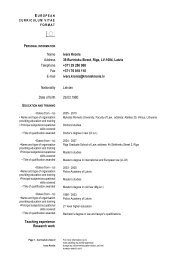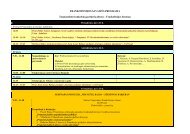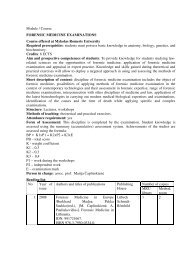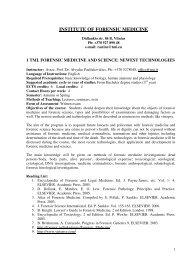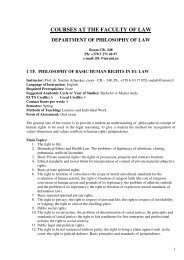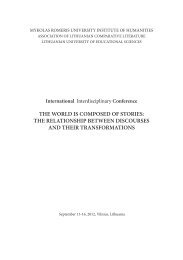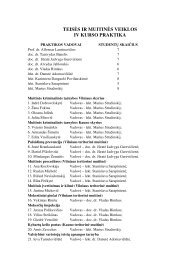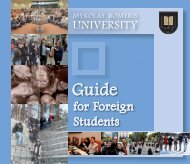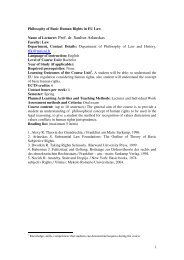SOCIAL MEDIA: CHALLENGES AND OPPORTUNITIES FOR ...
SOCIAL MEDIA: CHALLENGES AND OPPORTUNITIES FOR ...
SOCIAL MEDIA: CHALLENGES AND OPPORTUNITIES FOR ...
Create successful ePaper yourself
Turn your PDF publications into a flip-book with our unique Google optimized e-Paper software.
International interdisciplinary scientific conference /<br />
ICT APPLICATION <strong>AND</strong> STUDY TECHNIQUES IN ERASMUS EXCHANGE<br />
PROGRAMMES- STUDENTS’ MOBILITY SCHEMES<br />
Assoc. Prof. Dr. Vilhelmina Vaičiūnienė, Daiva Užpalienė<br />
Mykolas Romeris University<br />
Ateities str. 20,<br />
LT-08303 Vilnius, Lithuania<br />
vvaiciun@mruni.eu, duzpal@mruni.eu<br />
www.mruni.eu<br />
The promotion of students’ mobility in the EU has had a huge impact in recent years in Lithuania, which has<br />
now become one of the countries with more students going abroad on an Erasmus programme. Students from<br />
different cultures come together to study in host countries bringing with them different levels of language skills<br />
as well as expectations and beliefs of how they should be taught together. In other words, they contribute to the<br />
whole with their own academic, cultural and linguistic input. Rapid changes in the technological area challenge<br />
educational traditions in teaching. ICT application for teaching/learning purposes is becoming one of the major<br />
issue of contemporary education. Information technologies provide with a variety of opportunities and forms of<br />
learning; therefore it sometimes is a highly important factor, influencing learning.<br />
The authors of the article aim to present Erasmus Exchange students’ experience and attitudes to types of<br />
study techniques applied in different educational institutions of host countries. The teachers’ considerations and<br />
observations are based on the research findings obtained through the questionnaire survey. The conducted<br />
research focuses on Erasmus Exchange Students’ self-evaluation of their study techniques, ICT application and<br />
reflections about the challenges they have encountered in study process. For collection of data the qualitative<br />
research method was applied. The paper also addresses a very important issue of interrelation between study<br />
techniques and their educational aims to motivate students in study process.<br />
Keywords: ICT, Erasmus exchange programme, students’ mobility, evaluation of study techniques.<br />
<strong>SOCIAL</strong>INIAI MOKOMIEJI TINKLAI SUAUGUSIŲJŲ UŽSIENIO<br />
DALYKINĖS KALBOS MOKYME(SI)<br />
Dalia Žuvininkaitė<br />
Mykolas Romeris University<br />
Ateities str. 20,<br />
LT-08303 Vilnius, Lithuania<br />
dalzuv@mruni.eu<br />
www.mruni.eu<br />
Pranešime siekiama atskleisti socialinių mokomųjų tinklų galimybes suaugusiųjų profesinės užsienio (prancūzų)<br />
kalbos nuotolinio, tęstinio mokymo/mokymosi procesui realizuoti. Apžvelgiama socialinių tinklų klasifikacija, analizuojami<br />
frankofoniškųjų socialinių mokomųjų tinklų privalumai užsienio profesinės kalbos mokyme(si). Taikomi<br />
metodai: lingvistinis metodas, padedantis išsiaiškinti tikslias sąvokų reikšmes, ir įvairių šaltinių analizės metodas,<br />
kuriam pritaikomas konstruktyvistinis požiūris, susijęs su informacinių komunikacinių technologijų (IKT) taikymu<br />
užsienio (prancūzų) kalbos mokymo(si) procese.<br />
Socialiniai tinklai – interneto dalis, kuriai priskiriama tiek įvairūs diskusijų forumai, tiek sudėtingi visuomeniniai<br />
interneto projektai, tiek socialiniai mokomieji tinklai. Socialiniai tinklai yra bendravimo, informacijos sklaidos,<br />
taip pat ir pedagoginė priemonė užsienio profesinės kalbos mokyme(si), skatinanti tikslingai atsirinkti informaciją,<br />
naudingą besimokančiajam sakytinės ir rašytinės komunikacijos gebėjimams ugdyti.<br />
12



